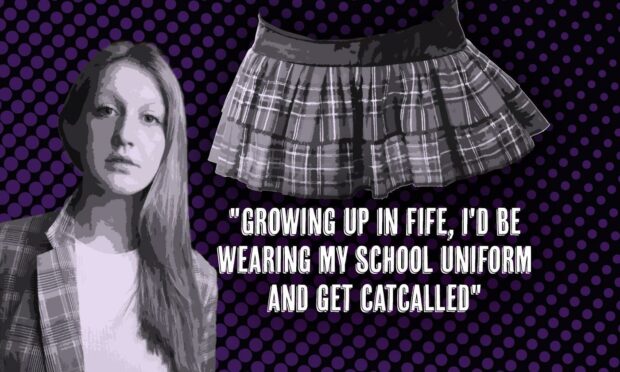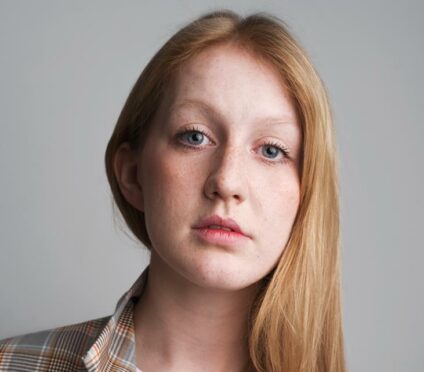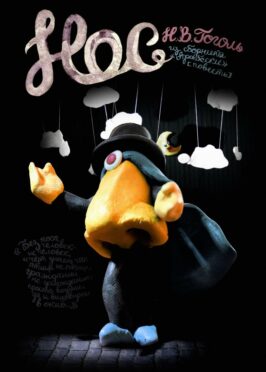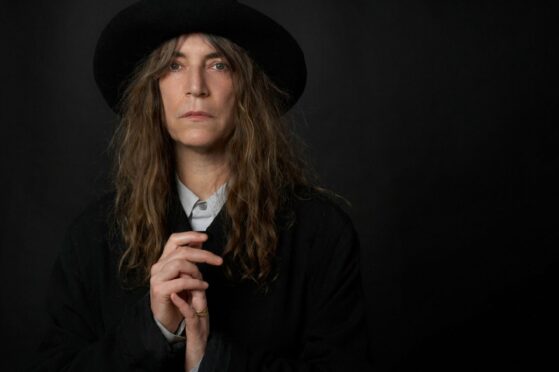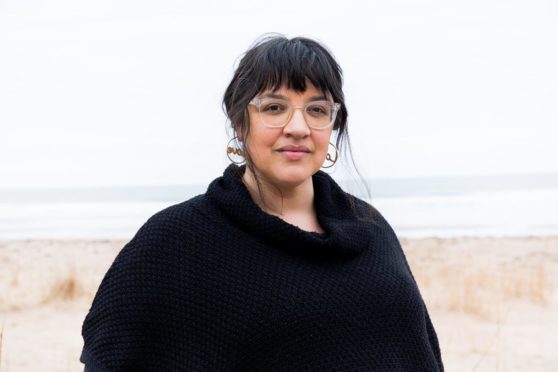Growing up in the tiny Fife village of Falkland, Ellen Bannerman found that speaking up about sexual assault just “wasn’t the done thing”.
Now aged 25, actor and playwright Ellen has teamed up with theatre company Wonder Fools to help young people approach the subject in a creative, thought-provoking way.
As part of their Positive Stories For Negative Times project, Wonder Fools have worked with the UK’s foremost drama artists to create a selection of free plays for schools and community groups to use.
And Ellen’s raucous play The Skirt, aimed at older secondary pupils, uses absurd humour and lovable characters to help young boys and girls alike approach the delicate subject of sexual assault.
It’s a subject which, for Ellen, hits close to home.
“When I was growing up in Fife, I’d be wearing my school uniform and get catcalled. And I felt so… ashamed,” admits the playwright, recounting an all-too-familiar experience for many young women across the country.
Just this year, a shocking ONS study revealed that almost half (44%) of UK women aged 16 to 34 years have experienced catcalls, whistles, unwanted sexual comments or jokes while walking in public.
Ellen goes on: “Whenever this kind of issue was brought up in a family situation, with matriarchal figures, it was seen as ‘this is an accepted part of the female experience, so let’s not rock the boat’.
“It even felt shameful to discuss it with pals. It just wasn’t done.
“So hopefully the play will make people feel more comfortable talking about their experiences.”
Skirt play hits issue on The Nose
Inspired by Nikolai Gogol’s absurdist play The Nose, in which a government official’s nose escapes his face and takes on a life of its own, The Skirt sees schoolgirl Kay’s tartan mini skirt run for Head Girl without her, after a sexual assault on the way to school causes her to pull out of the race.
“I’d seen the opera of The Nose with my mum, and I thought it was the most magical, strange story,” explains Ellen.
“I thought: ‘There’s a way to twist this to make it relevant to so many girls, and to my younger self.'”
And she hopes her own “absurdist parable” The Skirt can help pupils start difficult conversations by using humour to take some of the sting out of the sensitive subject.
“I wanted to make this something that was actually empowering for young girls, rather than a narrative which was terrifying, which is something we see all the time on television,” she says.
“So the skirt is a separate entity from Kay, and the play is lighthearted.
“The people that inflict sexual harassment are almost like caricatures.
My skirt. What a f****** great Oxfam find! Proper punk. Still with a safety pin in its side and tobacco stench intact… Wouldn’t I feel better on that stage, delivering
my speech in… This? Who’s going to stand in my way?”Kay, The Skirt by Ellen Bannerman
“These themes (of sexual assault) can be triggering for so many people, but in The Skirt, I’ve tried my best to remove those triggers through absurdism.
“It’s a great way for us as an audience to step back and actually digest the story.”
Taking the lead from Patti and punk
The Skirt‘s main character Kay takes her lead from punk heroines like artist and musician Patti Smith, who became a cult-like figure of second-wave feminism.
It’s a history she wants young people, especially young boys, to be more aware of.
“I think at the moment, a lot of boys feel like the have to shy away from the subject matter because they see sexual harassment as a ‘female’ issue rather than a gendered issue,” she observes.
But for Ellen, like for many other young people discovering 20th Century counter-culture through TikTok and TV shows like Mad Men or That 70s Show, recognising the history of the issue was key to bolstering her confidence in talking and writing about it.
“I think with Patti Smith, because she was one of the first female punk artists and a lot of her work is poetic, I see a bit of a parallel with what I’m doing.
“There’s a lot we can learn from those 1970s feminists – like the Reclaim The Streets movement -” which we’re seeing again in 2021 “- and the Guerrilla Girls, those massive artistic feminist icons.
“The movement’s always been there.. and it’s important that young people understand that because growing up, I didn’t.
“I didn’t understand that (misogyny) isn’t something new, this is a problem we’ve been dealing with for a very, very long time.”
Ambitious debut for young Fifer Ellen
Before 2020, actor Ellen never took herself seriously as a writer.
But supported by acclaimed playwright and Makar Hannah Lavery – “a top woman” – and fuelled by the social uprisings she saw taking place around her during the lockdowns, she began to believe she could make a difference.
“I think that during the pandemic, it wasn’t just Covid – there was a lot of negatives,” explains Ellen, who appeared in Netflix show The Alienist and Rona Munro’s Rebus: Long Shadows before the pandemic began.
“The things that were happening around George Floyd and then later Sarah Everard, they were really traumatic events. But in a weird way, I saw on social media a real political movement and spark in people’s imaginations.
“I could see people thinking, ‘maybe after this pandemic, there could be a brighter future’.
“I wanted to inspire young people to not be afraid of that, but to be a part of it.”
Positive Stories For Negative Times
Which is where Positive Stories For Negative Times comes in.
After a successful first run, season two of the international theatre project is running from September 2021 to July 2022, and this season’s focus is all about changing the way theatre is brought to young people and reacting to issues they may be facing.
The project offers free scripts and resources to schools or youth groups, to let people between the ages of six and 25 to have a go at learning and performing whatever stories appeal to them.
Groups taking part can then pin their efforts on the Positive Stories map and upload their final performance to share with other groups around the world.
Wonder Fools co-founder Robbie Gordon welcomed the response to season two, saying: “It has been an utter joy to see so many young people across Fife, Scotland and internationally engage with Positive Stories For Negative Times.
“We saw so much creativity arise from lockdown last year, and Season Two of the project gives us the opportunity to work alongside our new Youth Board to commission Ellen and six other incredible artists with an exciting range of work to serve the needs of different groups of young people to tell stories that they can connect with.”
The Skirt, along with the rest of season two of Positive Stories For Negative Times, is available for free until July 2022.
Interested groups can find out more about workshops and resources, and sign up to the project, via the website. Sign-ups close in March 2022.
Related:
